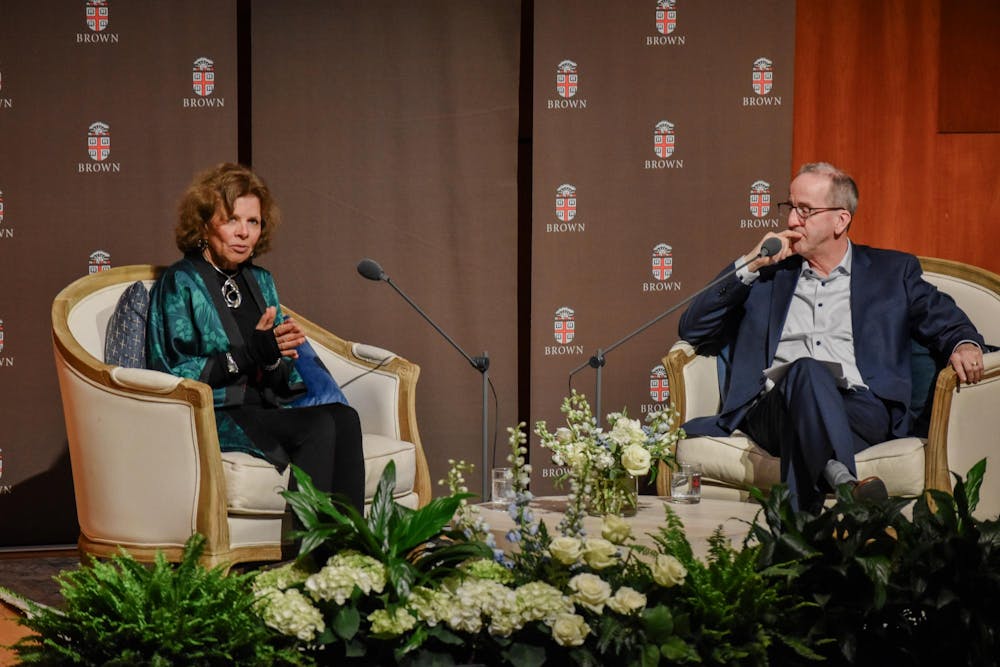Former ACLU President Nadine Strossen visited Brown Thursday evening to discuss the importance of free speech in government and academia. Moderated by University Provost Francis Doyle, the talk “Speaking Freely,” held in Salomon Hall, examined American legal protections for free speech and the obligations of universities to facilitate dialogue.
Strossen’s talk is part of a broader effort by the University to encourage campus dialogue on academic freedom and freedom of expression. “Particularly during periods of intense national and global activism, we get frequent inquiries … about Brown’s policies governing freedom of expression,” Dean of Faculty Leah VanWey said when introducing the event.
“Our policies reflect the fact that the protection of freedom of expression is absolutely essential for faculty, staff, students and alumni with a broad range of viewpoints to come together to learn from each other,” VanWey continued.
Strossen emphasized the importance of defending all speech, especially when we might disapprove of its content. “It is especially important for members of any minority group … We're never going to have access to the majoritarian levers of power, so we especially depend on freedom of speech that is robust enough to extend to hate speech, because such a subjective term is predictably going to be disproportionately used against our speech,” she said.
Strossen also said that, rather than define and legislate hate speech, “the Supreme Court has repeatedly, consistently and essentially unanimously said that the answer to speech whose idea we hate is not to suppress it, but to … counter it.”
In legal terms, there are no categories of harmful and protected speech based on content, Strossen said. Instead, the Supreme Court has focused on “viewpoint neutrality or content neutrality. The government may never punish or restrict speech solely because of dislike,” she said.
Rather than legal intervention, Strossen focused on “counter-speech” to address harmful content, which she said must be peaceful and nondisruptive. The “heckler’s veto,” the strategy of shouting to prevent a speaker from being heard, is not legally protected under the First Amendment.
After examining the constraints the First Amendment places on government, the discussion turned to the obligations of universities to uphold free speech. “I certainly would not say that universities … have a First Amendment duty to adopt principles of institutional neutrality,” Strossen said.
Private universities are not bound to neutrality, but many adopt it voluntarily, refraining from issuing statements on social and political issues not directly related to the institution, Strossen said. Those policies are usually aimed at protecting the expression of varied opinions, keeping a university open to ideological diversity.
“A university… has a unique opportunity and therefore responsibility to be a safe space for dispute and disagreement,” Strossen said.
In her opening remarks, Strossen praised the former University President Ruth Simmons for her stance that “education at its best is the antithesis of comfort.” To Strossen, shielding students from disagreement should not be the goal of universities.
But Strossen stressed that a commitment to institutional neutrality doesn’t commit a university to content neutrality. While the government is obligated to maintain content neutrality, universities can and should examine the content. “There may well be legitimate important pedagogical reasons to bring a controversial speaker to campus,” but this is still a university’s choice, she said.
Being afforded a platform at a university is “a very selective process, and it is appropriate to take into account the content and the message,” Strossen said.
Several attendees asked about how ideals of free speech interact with social, institutional and political norms. According to Strossen, self-censorship, “cancel culture” and other restrictive methods risk stifling the diversity of opinions that universities ought to foster. The majority “of students on every campus survey say that they cannot have a frank and candid conversation … even with other students about a whole range of important issues,” she said.
"Engaging with multiple perspectives and encouraging civil discourse surrounding difficult issues is really important, especially in an educational institution,” said Margo Donohue ’26, who asked Strossen about the University's responsibilities in encouraging student receptivity to differing perspectives.
“I thought Nadine did a really great job addressing the… distinction of civility and free speech,” Donohue added.
“I feel like there are a lot of people on campus… right now who really could have benefited from hearing this,” said Andrew Willwerth ’24, who served as The Herald’s treasurer and general manager for finance in 2023. “Strossen really addressed how both the University and administrators … can balance allowing for open discourse (while) also standing up for human rights.”
As a final piece of advice, Strossen articulated “the golden rule for free speech: if you want to have freedom for the speech that you love, then you must defend freedom for the speech that you loathe.”





